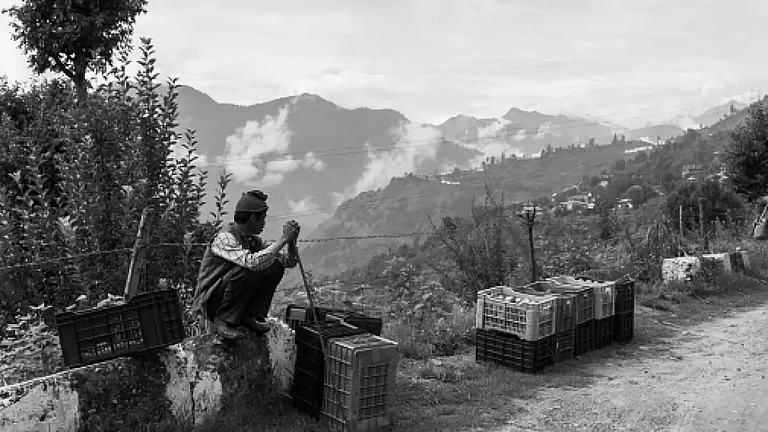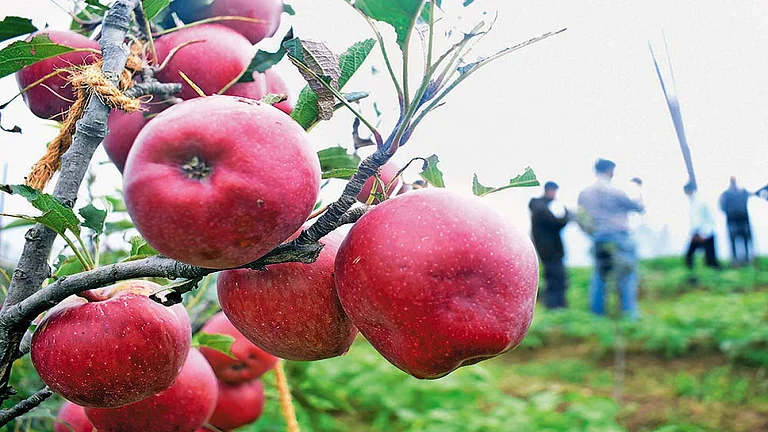Hundreds of fully grown, apple-laden trees—the pride of Himachal Pradesh’s flourishing fruit belt in Jubbal-Kotkhai, Rohru, and Chopal—are under the axe just ahead of the season's harvest time, causing a blow to the region's farm economy, which is also a symbol of prosperity in the hills.
Meanwhile, High Court on Wednesday directed the state government to ensure uniform and transparent action against all forest land encroachers even as the court took notice of alleged irregularities in eviction drives at village Chaithala in Kotkhai. The matter was heard by a Division Bench comprising of Justice Vivek Singh Thakur and Justice Bipin Chandra Negi.
During the hearing, the state government informed the court that around 300 bighas of forest land had been cleared and approximately 3,800 apple trees illegally planted on these lands were felled in compliance with the court’s directives.
Barring a few protest rallies initiated by left-wing unions, including the Seb Utpadak Sangh—a farmers' organization—the aggrieved orchardists remain quiet and silently observe the actions of the forest officials. There is a heavy deployment of police forces in the area to prevent any physical attack or resistance by the apple owners.
Previously, the Deputy Commissioner, Shimla, Anupam Kashayp, had ordered the temporary seizure of firearms in and around Chaithla village to ensure the peaceful execution of court orders. Licensed firearms holders in the area are required to deposit their weapons at the Kotkhai Police Station by July 12, where they will remain in custody until July 18.
The order aimed to prevent a "potential law and order" situation during the removal of encroachments on the forests. The ban, said DC Shimla, applies to all licensed firearms holders in and around Chaithla village.
“We can’t do anything. Everything is happening before our eyes. Initially, the High Court had ordered that families having encroached on the forest land less than five bighas should be spared. But the forest order says, irrespective of the land in possession of those encroachers, the apple trees must be cleared,” said an orchardist at village Chaithala, the village now the nucleus of the felling drive.
The village has 40 to 50 families who give credit to their prosperity and modern development to apple crops. Almost everyone in this village has encroached on the forest land to raise several bighas of apples and has earned wealth. The elevation and climatic conditions in the belt aptly suit the apples, which have produced the best quality apples during the past two and a half decades.
The state’s revenue and horticulture minister, Jagat Singh Negi, says the issue of encroachment on the forest land is not new. It has already been adjudicated by the High Court.
"All these cases have undergone a thorough review process. It was Deputy Commissioner Shimla who passed the orders after divisional commissioner. Now, finally, the High Court has delivered its verdict."
"The government, including the forest department, has been asked to implement the court's orders," he stated, acknowledging his lack of ability to take any action.
He said, "Under the existing conditions, the state government can't do an intervention or frame a policy outside the ambit of the Forest Conservation Act, 1980.”
Negi, however, asserts that the government did approach the court, pleading for a temporary stay on the cutting of the trees and allowing the harvest to be completed. Unfortunately, the High Court did not accept the plea.
"We have no choice but to comply with the court’s orders,” the minister confirmed.
Prakash Tajta, one of the orchardists who will also be facing the cutting down of the fully laden fruit-laden plants, said, “We have raised these healthy plants like our children. It has pained us a lot how the plants got cut weeks before the harvest."
If you talk of encroachments, everyone knows the reality. We certainly need the forests to save for maintaining temperature and regulating snow and rain, which is crucial to the crop. Climate change has already impacted apple growers. But even if the trees are cut, I wonder if the forest will come up in their place. The land will turn barren, he fears.
The apple economy of Himachal Pradesh is deeply rooted in the relentless hard work and dedication of hill families. The tireless dedication of families has driven them from cultivating traditional apple varieties in the early years to later adopting high-value, climate-resilient foreign varieties with higher productivity. That continues even today to fight the market competition and the invasion of foreign apples in the 온라인카지노 markets.
The Dr. Y.S. Parmar University of Horticulture and Forestry has also played a vital role, supporting disease management, scientific interventions, and improved orchard practices to sustain and enhance apple production in the state.
But a hard reality to the scenario also remains that the orchards were raised illegally, felling the forests and encroaching on the forest lands. While there are several small apple growers who have chosen to raise the orchards to make up their livelihoods, a large percentage of the apple growers who lobby (so to speak) are economically and politically influential families. These influential families enjoy government protection against eviction from the forest lands.
Tikender Panwar, the former Deputy Mayor of Shimla and an environmentalist and policy expert, holds a different argument.
"There is a simple question. Will the large-scale felling of apple trees contribute to environmental protection? To me, the action seems to be driven solely by a rigid, legalistic interpretation rather than ecological considerations," he says.
Panwar feels that the action of cutting down healthy and productive apple plants, irrespective of their legal status, is neither scientific nor ecologically sound. He also draws a comparison between encroachments on the forest land to build multi-story buildings and commercial properties.
The situation underscores that environmental laws cannot be applied with excessive rigidity. The farmers who planted those apple trees weren’t mining the land, or raising dams on the rivers, or constructing urban malls—they were nurturing nature, not exploiting it.
The farmers affected by the apple-felling drive were not just cultivating fruit—they were sustaining their families and contributing to the region’s green cover. Their situation called for empathy and nuanced understanding, not harsh, one-size-fits-all action.
















